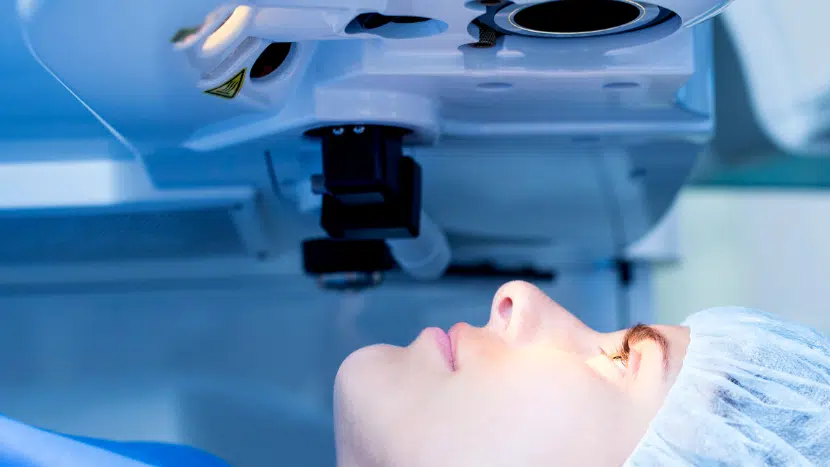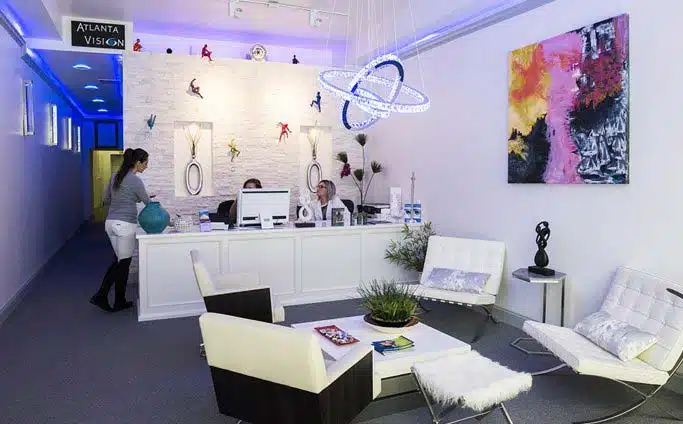
Some people are born with vision deficiencies. Many others develop them over time, and they can start at any stage of life. Either way, most people with vision deficiencies will seek some sort of vision correction. This helps them better perform everyday tasks such as reading, driving, and other activities.
When it comes to vision correction, glasses are the oldest form. However, during the last century, contact lenses came onto the scene. This invention answered concerns about losing or breaking glasses. Contact lenses also found favor with people who didn’t like how they looked with glasses on, or who felt stigmatized by having to use them.
In more recent years, ophthalmology advancements have allowed the development of a newer, more effective form of vision correction: laser eye surgery, a procedure available here at the Atlanta Vision Institute.
What Is Laser Eye Surgery?
Laser eye surgery has improved the vision and lifestyle of countless patients now. An experienced eye surgeon uses a laser to reshape the cornea and the clear front part of the eye. The procedure is safe and effective, and it restores vision to 20/40 (the legal cutoff for driving without glasses), or better.
Many people think laser eye surgery and LASIK are the same thing. However, LASIK is a popular type of laser eye surgery, while laser eye surgery is a broad category of different types of laser eye surgery. LASIK is also one of several vision correction procedures we perform here at the Atlanta Vision Institute.
Not everyone with vision loss is a candidate for laser eye surgery. The best way to find out if you are is to schedule a consultation with us. You can also get a general idea by taking this quick LASIK Vision Quiz, but only a consultation will produce a definitive result.
Why Laser Eye Surgery Is Better Than Contact Lenses
Laser eye surgery is more expensive than getting contact lenses, but laser vision correction is superior to contact lenses for several reasons:
- Daily disinfection is required for contact lenses. The constant maintenance is a hassle.
- As with glasses, your prescription will change over time, so you’ll have to replace contact lenses periodically. This adds to expenses.
- It’s easy to lose or damage contact lenses, which means paying for new ones.
- Putting contact lenses in and taking them back out daily is a hassle and can be uncomfortable.
- With contact lenses, you can experience halos or blurring around bright lights.
- With laser eye correction, there’s no daily maintenance.
- There’s also nothing to lose or damage since contact lenses are not being used.
- When the procedure is performed correctly, the corrections last decades, if not for the rest of your life.
- Because maintenance and replacements aren’t involved, laser eye surgery costs you less over time, even though it costs more upfront.
To learn about the vision correction procedures performed at the Atlanta Vision Institute, please visit our website. You can also schedule a free consultation on our website!
Recent Innovations in Laser Eye Surgery
Laser eye surgery itself has already been a transformative innovation. With advances in technology, though, it continues to get even better. The following are some recent eye surgery innovations and how they’re already having an impact.
Femtosecond Lasers
In a LASIK procedure, the doctor uses a surgical blade to create a flap in the cornea. A femtosecond laser is a more precise alternative to the surgical blade. The flaps these lasers create are thin at a microscopic level, and they reduce dry eye. This technology makes LASIK available to patients who otherwise would not be eligible for LASIK due to thinner corneas.
The femtosecond laser also plays an important role in a vision correction procedure called SMILE– small incision lenticule extraction. SMILE procedures are commonly used to treat nearsighted patients.
Wavefront LASIK
This is a type of excimer laser vision correction. Excimer procedures require removing, or excising, tissue from the cornea. These procedures most commonly are used to treat myopia, but they can be effective for treating farsightedness and astigmatism as well.
Wavefront technology maps the eye’s surface. In doing so, doctors can identify, measure, and diagram minute aberrations that contribute to blurry vision. As a result, it’s possible to create a customized, more precise treatment plan for the patient.
Wavefront LASIK is especially effective in cases where blurry vision persists even after a normal LASIK procedure. That’s due to the precision mapping the process performs.
Photorefractive Keratectomy (PRK)
PRK is also an excimer laser vision correction procedure, and it’s similar to LASIK. Like LASIK, PRK reshapes the cornea by using a laser, but it does not create flaps. PRK instead removes the top layer of the cornea by applying a laser directly to it.
The vision results from PRK procedures are similar to those produced by LASIK and SMILE procedures. Full vision correction may take longer to achieve, though.
Both LASIK and PRK are among the vision correction procedures we perform here at the Atlanta Vision Institute. Schedule a consultation with us to determine whether you’re eligible for them or other procedures.
Intraocular Lens Implants
For patients who don’t qualify for laser eye surgery, but are tired of dealing with glasses or contact lenses, there’s good news: the Atlanta Vision Institute can help with intraocular lenses.
An intraocular lens is a lens implanted in the eye, usually to treat cataracts. It can also treat nearsightedness, farsightedness, and age-related vision deterioration. To get a simpler idea of how this works, think of it as having permanent contact lenses. You get all the benefits without the hassle.
During a procedure we perform called Clear Lens Exchange, we remove the natural lens from the eye. Then we implant the intraocular lens, which corrects for various distances and light conditions.
When you schedule a consultation with us, we’ll be able to determine whether or not you’re a candidate for laser vision correction. If you aren’t, we’ll look at options such as Clear Lens Exchange and other procedures that might be able to help.

Please Take Our LASIK or Cataract Surgery Quiz
Take our vision quiz to find out if you qualify for LASIK or cataract surgery!


